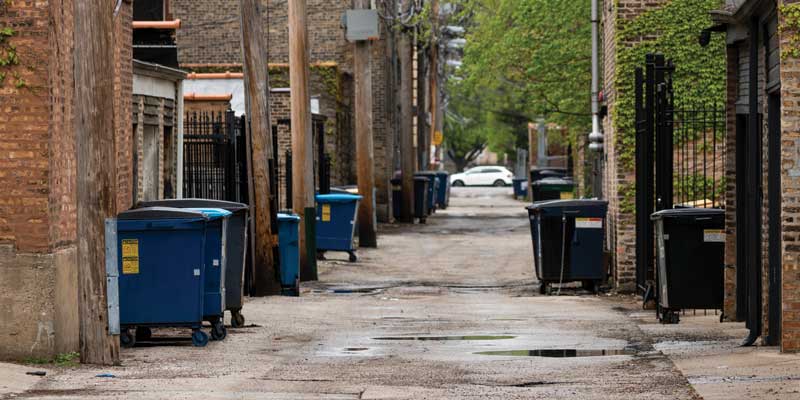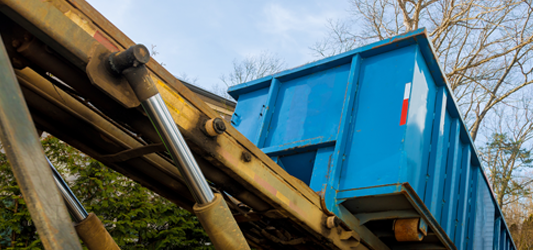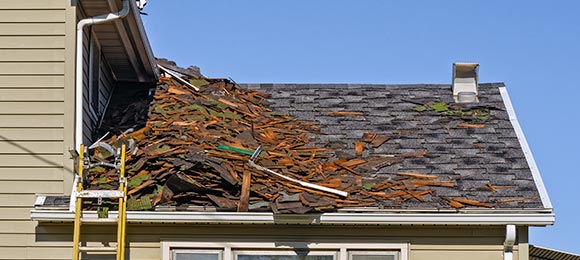
Updated July 22, 2025
When replacing a shingle roof, calculating the weight of the roof debris produced during the tear-off process is an essential part of minimizing the cost of disposal. Understanding the weight of your shingles makes it easier to select a dumpster service offering the right weight allowance and helps you avoid or minimize expensive overweight charges (up to $100 per ton in some areas).
Step one to saving money on roofing disposal is to estimate how much the shingles weigh that you're tearing off the roof. Then compare dumpster rates among multiple companies with a sharp eye on the amount of weight included in the price.
Roofing shingles are very dense compared to other wastes, like household junk or trash. So packing a 10 yard or 20 yard dumpster to the rim can make it very heavy and sometimes lead to an expensive overweight charge when your container is weighed at the landfill or shingle recycling center.
Use the information below to help determine how much your roofing debris will weigh and how best to avoid incurring any overage fees.
Jump to:
- Understand Shingle Weight
- Calculate Roof Weight
- Choose the Right Dumpster Size
- Find the Right Dumpster Rental Provider
Need a dumpster? Get free local quotes today.
Request availability and pricing from dumpster
rental companies near you.
Understand Shingle Weight
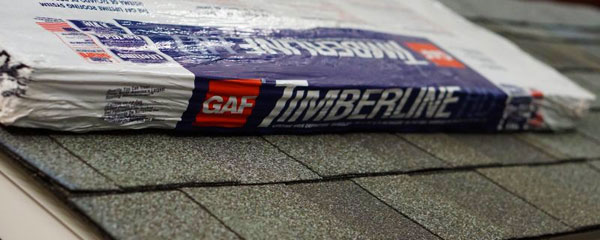
One way to get a rough estimate of the total weight of your old shingles is to figure out the total weight of the new shingles you're installing. Multiply the weight of a bundle of shingles by the total number of bundles ordered for your job to get a rough estimate.
Weight of 1 Bundle x Total Number of Bundles x Number of Shingle Layers
= Estimated Total Weight of Shingles
This estimate will likely be a bit high because your old shingles have likely lost some of their granules, making each shingle slightly lighter.
The vast majority of roof shingle bundles weigh between 50 and 80 lbs. However, type, style, and quality of shingle has a big impact on weight. For example, architectural style shingles generally weigh 65 to 80 lbs per bundle, while 3 tab shingles weigh 50 to 65 lbs per bundle. Likewise, shingles with a 30-year warranty will likely weigh more than shingles with a 20-year warranty.
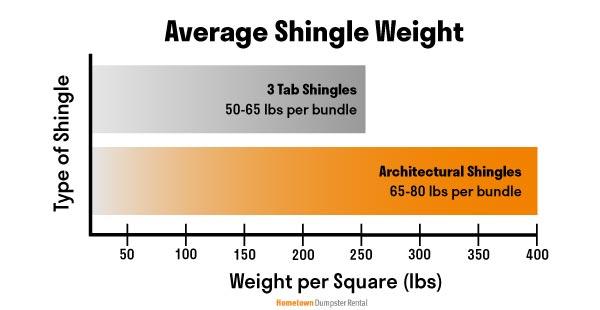
If you know the number of square of your roof, you can estimate weight that way as well. A square—equivalent to 100 square feet—is a standard unit of measurement in the roofing industry. Typically, three bundles of shingles will cover one square—33 sq. ft. per bundle. For the thickest of shingles, it may take four bundles per square—25 sq. ft. per bundle.
On average, one square of shingles typically weighs 250 to 300 lbs. The thickest and most dense roofing shingles may weigh 320 to 400 lbs per square.
As previously mentioned, the weight of shingles does vary by type and by manufacturer. Architectural shingles are thicker and heavier than basic 3-tab shingles. If removing and disposing of architectural shingles, estimate the total weight of the debris using figures on the higher end of the scale (e.g., 80 lbs per bundle).
It’s always better to overestimate the weight of roofing debris as opposed to underestimating.
How to Calculate Roof Weight
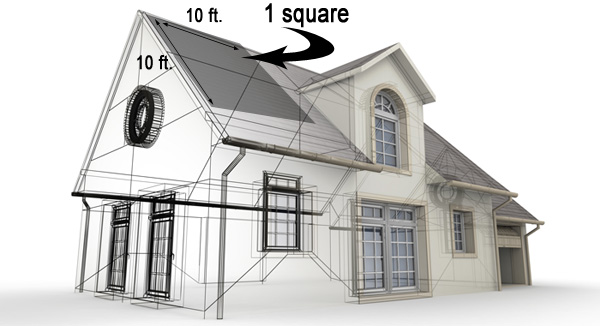
Determine roof size by measuring the length and width of each face and then add them together to reach a total square footage of the roof. This is relatively easy for simple roof designs, such as basic hip, gable, or flat roofs. Complicated roofs will be tougher to measure, but taking the time to measure it accurately can save you money in the long run on disposal costs and on the purchase of new product.
Once the square footage of the roof is determined, you can estimate the amount of roofing debris that will be generated during the tear-off. From there, you can estimate the total weight of the debris. Finally, you can then choose the right dumpster to accommodate the cleanup.
Example: A roof that measures 2,000 sq. ft. translates into 20 square. The type of shingle is a traditional 3-tab asphalt shingle. The weight of one square of 3-tab shingles typically ranges from 150 to 195 lbs. We’ll use the higher number to ensure the weight allowance of the dumpster doesn’t become a factor. Take 195 lbs. multiplied by 20 square, and the result is 3,900 lbs., or nearly 2 tons. In this example, the roof tear-off would result in about 2 tons of shingle debris, and that’s the figure to use when determining the ideal dumpster size for the cleanup.
Learn more: Renting a Dumpster for Roofing Shingles: Everything You Need to Know
Take Note of Multiple Layers
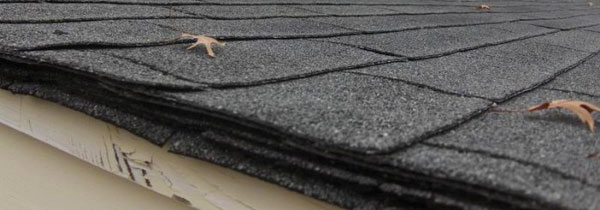
It’s not uncommon for a house to have two or more layers of shingles. Do not forget to factor this into your equation when calculating the estimated weight of the roofing debris. If there are two layers, multiply the debris weight by two; three layers, multiply it by three; and so on. If tearing off dimensional shingles, odds are there are no layers of shingles underneath.
Multiple layers will generally only apply when removing 3-tab shingles, although it’s a good idea to check by removing a small section of shingles before ordering your dumpster.
Other useful articles:
- Dumpster Rental Cost Guide
- The Ultimate Guide to Dumpster Sizes
- 10 Yard Dumpster Guide: Convenient Size, Great Price
- 20 Yard Dumpster Guide: Versatility and Affordability
Compare Dumpster Rates and Save Today
Request availability and pricing from dumpster
rental companies near you.
Choose the Right Dumpster Size
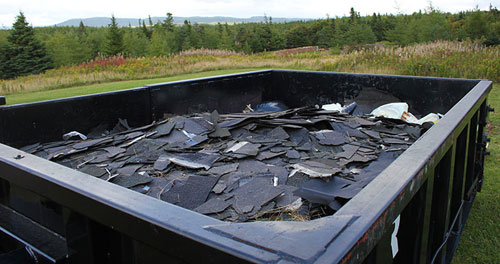
Once you’ve determined the approximate amount of roofing debris you’re working with, it’s time to choose a roll-off container to dispose of it. If you give this information to the dumpster company over the phone, they will be able to recommend the ideal container size based on the type and amount of debris.
In most cases, a 10 or 20 yard dumpster will do the job. Some dumpster rental companies won’t allow roofing shingle debris in 30 or 40 yard bins due to weight. The weight of the shingles and the container itself can push the limits of the roll-off truck 's ability to lift the load.
Know Your Dumpster's Weight Limit
A larger dumpster generally costs more than a smaller dumpster. But with roofing shingle debris, it’s just as important to know the amount of weight that is included in the price of your rental.
Consider the following quotes for a 10 yard dumpster:
- Company A: $300 up to 2 tons of weight, $75 per ton over
- Company B: $375 up to 4 tons of weight, $75 per ton over
Company A may seem like the better deal, but if you're tearing off 4 tons of shingles, Company A's total cost becomes $450. You'll save $75 by renting from Company B.
How Much a Dumpster Full of Roofing Shingles Weighs
Roofing shingles are surprisingly heavy. One square (100 sq ft) weighs 250-300 lbs on average. That weight adds up quickly, especially with multiple layers being torn off. Some rental companies may restrict shingle disposal to smaller sizes to avoid overweight loads.
The table below breaks down how much the most popular dumpster sizes would weigh if they were filled with roofing shingles. (Keep in mind, these are averages, and your roofing debris may weigh more less than the figures below.)
Estimated Weight of Roofing Debris by Dumpster Size
| Dumpster Size | Volume (yd³) | Weight Range |
|---|---|---|
| 10 Yard | 10 | 3-3.75 tons |
| 15 Yard | 15 | 4.5-5.25 tons |
| 20 Yard | 20 | 6-7.5 tons |
| 30 Yard | 30 | 9-10.5 tons |
| 40 Yard | 40 | 12-13.5 tons |
The weight of roofing shingles is so heavy, if they were to fill most dumpster sizes, they would typically exceed that dumpster's weight limit. As such, make sure you choose the dumpster with the a large enough weight limit to manage the debris, and avoid filling the dumpster to the top, regardless of the size.
Note: When disposing of shingles, there are usually other wastes that need to be disposed of as well, including felt/waterproofing, nails, plywood decking, and gutters and flashing in some cases. Check with the dumpster rental companies you speak to in order to be sure you understand their rules for disposing of mixed debris with your roofing shingles. Dumpster rental companies may require "clean loading" the roofing shingles, which refers to loading only shingles—no other wastes—in the dumpster. This is typically the case if the shingles are to be recycled.
The weight of these items are also something to keep in mind. This is especially true if all, or a major portion, of the roof decking, gutters, or flashing are being disposed of.
Find the Right Dumpster Rental Provider
We recommend contacting three or more companies and comparing their reputations, availability, prices, and weight allowances before booking your dumpster.
Make sure you know what is included in each quote so you can compare each one accurately.
Continue reading:
- Finding a Reputable Dumpster Company to Rent From
- Why Roll-Off Containers Are Perfect for Heavy or Bulky Items
- Guide to Renting a Dumpster for Roofing Shingles

